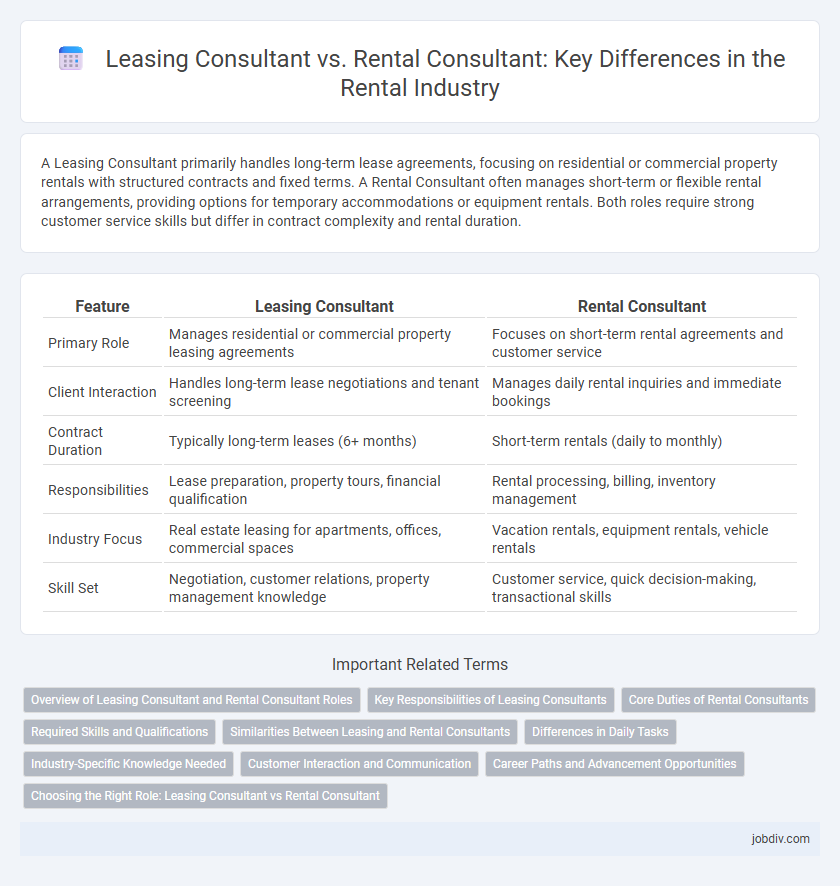A Leasing Consultant primarily handles long-term lease agreements, focusing on residential or commercial property rentals with structured contracts and fixed terms. A Rental Consultant often manages short-term or flexible rental arrangements, providing options for temporary accommodations or equipment rentals. Both roles require strong customer service skills but differ in contract complexity and rental duration.
Table of Comparison
| Feature | Leasing Consultant | Rental Consultant |
|---|---|---|
| Primary Role | Manages residential or commercial property leasing agreements | Focuses on short-term rental agreements and customer service |
| Client Interaction | Handles long-term lease negotiations and tenant screening | Manages daily rental inquiries and immediate bookings |
| Contract Duration | Typically long-term leases (6+ months) | Short-term rentals (daily to monthly) |
| Responsibilities | Lease preparation, property tours, financial qualification | Rental processing, billing, inventory management |
| Industry Focus | Real estate leasing for apartments, offices, commercial spaces | Vacation rentals, equipment rentals, vehicle rentals |
| Skill Set | Negotiation, customer relations, property management knowledge | Customer service, quick decision-making, transactional skills |
Overview of Leasing Consultant and Rental Consultant Roles
Leasing consultants primarily focus on marketing rental properties, screening prospective tenants, and facilitating lease agreements to ensure occupancy rates remain high. Rental consultants handle customer inquiries, assist with property tours, and manage rental application processes, emphasizing excellent customer service and tenant satisfaction. Both roles require strong communication skills and knowledge of rental policies but differ in their emphasis on leasing management versus rental coordination.
Key Responsibilities of Leasing Consultants
Leasing Consultants primarily focus on marketing rental properties, conducting property tours, and guiding prospective tenants through application and lease-signing processes. They verify tenant qualifications by reviewing credit reports, employment history, and rental references to ensure consistent occupancy rates. Their role also includes managing lease renewals, resolving tenant concerns, and maintaining compliance with local housing regulations.
Core Duties of Rental Consultants
Rental Consultants primarily focus on assisting prospective tenants by showcasing available properties, explaining lease terms, and facilitating the application process. They conduct property tours, screen applicants, and ensure that lease agreements comply with local rental laws, enhancing tenant satisfaction and retention. Leasing Consultants, while similar, often handle broader responsibilities including lease negotiations, renewals, and managing tenant relations throughout the lease term.
Required Skills and Qualifications
Leasing Consultants need strong sales skills, knowledge of property management software, and expertise in local real estate laws to effectively handle lease agreements and tenant relations. Rental Consultants require customer service proficiency, attention to detail, and familiarity with rental market trends to assist clients in finding suitable properties and processing rental applications efficiently. Both roles benefit from excellent communication abilities, organizational skills, and a background in property leasing or management.
Similarities Between Leasing and Rental Consultants
Leasing consultants and rental consultants both specialize in facilitating property occupancy, managing tenant relations, and coordinating lease agreements to ensure smooth rental processes. Each role requires strong communication skills, knowledge of property management software, and expertise in local housing laws to address client needs effectively. Both professionals prioritize customer service excellence while maximizing occupancy rates and maintaining rental property standards.
Differences in Daily Tasks
Leasing consultants primarily handle property showings, lease agreements, and tenant screening to secure long-term residents. Rental consultants focus on short-term rentals, managing day-to-day bookings, customer inquiries, and immediate availability updates. The daily tasks of leasing consultants center around contract negotiations and lease renewals, whereas rental consultants prioritize rapid turnover and customer service for transient clients.
Industry-Specific Knowledge Needed
Leasing consultants require in-depth knowledge of property management, local real estate market trends, and lease agreement regulations to effectively match clients with suitable rental units, ensuring compliance and optimal occupancy rates. Rental consultants focus on customer service skills and understanding tenant needs, often dealing with short-term rentals or equipment leases, necessitating familiarity with rental policies and inventory management. Both roles demand strong communication abilities, but leasing consultants typically handle more complex legal and financial aspects within the residential or commercial property leasing industry.
Customer Interaction and Communication
Leasing consultants specialize in securing long-term tenants by providing detailed property information, handling lease agreements, and addressing applicant concerns with clear, persuasive communication. Rental consultants focus on shorter-term rental needs, emphasizing quick responses, flexible terms, and clear explanations of rental policies to ensure smooth customer interactions. Both roles require strong interpersonal skills and the ability to tailor communication to individual client preferences, enhancing customer satisfaction and retention.
Career Paths and Advancement Opportunities
Leasing Consultants typically specialize in commercial or residential property leasing, offering a clear path toward property management or real estate sales roles, while Rental Consultants often focus on short-term or vacation rental agreements with advancement opportunities in customer service management or rental operations. Career growth for Leasing Consultants involves gaining property management licenses and deepening real estate market knowledge, which can lead to higher-level property management or leasing director positions. Rental Consultants benefit from honing client relations and operational skills, progressing toward roles such as rental office managers or regional rental coordinators.
Choosing the Right Role: Leasing Consultant vs Rental Consultant
Leasing consultants specialize in securing long-term residential or commercial leases, managing application processes, and ensuring tenant retention through effective relationship-building and property showings. Rental consultants focus on short-term rental agreements, handling transient tenant needs, and facilitating quick turnover while optimizing occupancy rates. Selecting the right role depends on whether your career interest lies in long-term tenant management or short-term rental operations within the real estate market.
Leasing Consultant vs Rental Consultant Infographic

 jobdiv.com
jobdiv.com